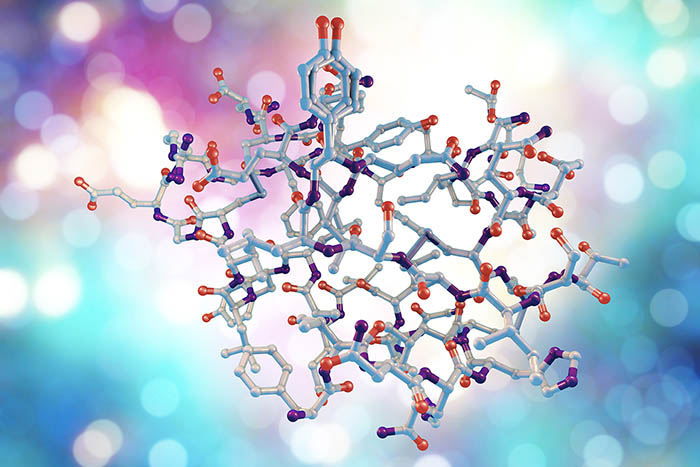2024-07-09
Peptides are the ideal drug molecules because of their high affinity, high selectivity, low toxicity, and easy synthesis. Scientists have also developed novel peptide drugs that can treat multiple diseases based on these qualities. In this article, advances of research on peptide drug therapy in recent years have been reviewed.

1. Development of Peptidomimetic Inhibitors of the ERG Gene Fusion Product in Prostate Cancer
After skin cancer, prostate cancer is the most common cancer and the third-leading cause of cancer death in American men, according to the American Cancer Society. Researchers from the University of Michigan identified a large molecule which selectively attacks prostate tumors that have a genetic anomaly without harming healthy cells. The fusion of the genes TMPRSS2 and ERG is a key step in the development of prostate cancer, but ERG has proven to be a challenging target for the type of small-molecule inhibitors that have had recent successes in treating cancer. The Michigan team used large molecule peptides to target ERG. Studies in cell lines and animal models suggest this approach can effectively target and degrade the ERG fusion with little impact on regular cell function. Their findings are published in Cancer Cell.
2. Antiviral activity of peptide inhibitors derived from the protein E stem against Japanese encephalitis and Zika viruses
Japanese encephalitis virus (JEV) and Zika virus (ZIKV) are mosquito-borne viruses of the Flavivirus genus that cause viral encephalitis and congenital microcephaly, respectively, in humans, and thus present a risk to global public health. The envelope glycoprotein (E protein) of flaviviruses is a class II viral fusion protein that mediates host cell entry through a series of conformational changes, including association between the stem region and domain II leading to virion-target cell membrane fusion. In this study, peptides derived from the JEV E protein stem were investigated for their ability to block JEV and ZIKV infection. Peptides from stem helix 2 inhibit JEV infection with the 50% inhibitory concentration (IC50) in the nanomolar range. One of these peptides (P5) protected mice against JEV-induced lethality by decreasing viral load, while abrogating histopathological changes associated with JEV infection. We also found that P5 blocked ZIKV infection with IC50 at the micromolar level. Moreover, P5 was proved to reduce the histopathological damages in brain and testes resulting from ZIKV infection in type I and II interferon receptor-deficient (AG6) mice. These findings provide a basis for the development of peptide-based drugs against JEV and ZIKV.
3. Scientists design a new peptide against bacteria
Over the past few decades, many bacteria have become resistant to existing antibiotics, and few new drugs have emerged. To help rebuild the arsenal against infectious diseases, many scientists are turning toward naturally occurring proteins known as antimicrobial peptides, which can kill not only bacteria but other microbes such as viruses and fungi. Researchers from the University of Brasilia and the University of British Columbia have now engineered an antimicrobial peptide that can destroy many types of bacteria, including some that are resistant to most antibiotics. The researchers found in tests in mice that this new peptide, which they called clavanin-MO, could kill strains of Escherichia coli and Staphylococcus aureus that are resistant to most antibiotics.
4. New technology could deliver drugs to brain injuries
Traumatic brain injuries come in many forms, from a mild concussion caused by playing football to a blow in a violent car crash that leads to unconsciousness and memory loss. On the other hand, the damaging effects that follow, such as inflammation, high levels of free radicals, and signaling difficulties that could lead to cell death, can be minimized. There are more than 100 compounds in preclinical tests for lessening brain damage after injury. Delivering them to the damaged areas, however, isn’t an easy task. Scientists at the Sanford Burnham Prebys Medical Discovery Institute (SBP) describe a technology that could lead to new therapeutics for traumatic brain injuries. They found a peptide sequence of four amino acids, cysteine, alanine, glutamine, and lysine (CAQK) that recognizes injured brain tissue. This peptide could also be used to deliver treatments that limit the extent of damage.
References:
Wang, X., Qiao, Y., Asangani, I. A., Ateeq, B., Poliakov, A., Cie?lik, M., ... & Wang, C. X. (2017). Development of Peptidomimetic Inhibitors of the ERG Gene Fusion Product in Prostate Cancer. Cancer cell, 31(4), 532-548.
Chen, L., Liu, Y., Wang, S., Sun, J., Wang, P., Xin, Q., ... & Wang, W. (2017). Antiviral activity of peptide inhibitors derived from the protein E stem against Japanese encephalitis and Zika viruses. Antiviral research, 141, 140-149.
Silva, O. N., De La Fuente-nú?ez, C., Haney, E. F., Fensterseifer, I. C. M., Ribeiro, S. M., Porto, W. F., ... & Lu, T. K. (2016). An anti-infective synthetic peptide with dual antimicrobial and immunomodulatory activities. Scientific reports, 6.
Mann, A. P., Scodeller, P., Hussain, S., Joo, J., Kwon, E., Braun, G. B., ... & Krajewski, S. (2016). A peptide for targeted, systemic delivery of imaging and therapeutic compounds into acute brain injuries. Nature communications, 7.